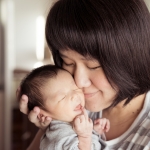Approximately 10-15% of women will experience mood symptoms that meet criteria for a Major Depressive Episode during the postpartum period. However, as many as 50% of women may experience some level of depressive symptoms during the postpartum period. Recent evidence suggests that even depressive symptoms that do not qualify for a diagnosis of postpartum depression may have a negative impact on both mother and child. In spite of the fact that so many postpartum women will experience depressive symptoms, little research has been conducted in order to identify potentially modifiable factors that could reduce the risk of depressive symptoms or the development of a major depressive episode during this time.
In a recent paper published in the Archives of Women’s Mental Health, Howell and colleagues attempt to examine modifiable risk factors associated with depressive symptoms in the postpartum period. Howell and colleagues note that much of the existing research predicting which women will experience postpartum depression uses a disease model, and as a consequence, there has been a failure to systematically investigate factors that may mitigate this risk. Using a two-item depression screener, Howell and colleagues surveyed 563 postpartum women at two weeks and six months postpartum, and categorized women as having never experienced depressive symptoms in the postpartum, having depressive symptoms at both assessments, having depressive symptoms at only two weeks, or having depressive symptoms only at six months postpartum. They collected information on “fixed” variables, such as demographic information (age, race, marital status, past history of depression, etc.), physical symptoms associated with the postpartum period (vaginal bleeding, breast pain, hemorrhoids, etc.), functional limitations, the degree to which the participant was involved with infant care tasks, and characteristics of the infant. Potential “buffers” for depression were also assessed, including how much social support women reported and women’s self-efficacy (or perceived confidence) around caring for their infant.
White race, higher education level, being married, and an absence of history of depression were the variables most associated with screening negative for depressive symptoms at either assessment. Women who screened positive for depressive symptoms at both time points were more likely to belong to a minority group, to have a history of depression, and to report more physical symptoms as well as lower levels of “buffering” factors, including social support. Women who screened positive for depressive symptoms at six months postpartum were similar to women who screened positive at other time points, but also reported a reduced amount of social support over time when compared to the two week assessment. Women who reported depressive symptoms at two weeks postpartum and not at six months postpartum reported an increase in self-efficacy, or their perceived ability to care for their infant, as well as a decrease in physical symptoms over time.
The authors report that while some factors associated with depressive symptoms in the postpartum period are “fixed,” such as race and past history of depression, some factors are potentially modifiable, such as level of social support and perceived self-efficacy around caring for an infant. The authors conclude that while more research is required, it is possible that intervening on these modifiable factors before the postpartum period could lessen the severity of depressive symptoms, or prevent their occurrence altogether, particularly among women at higher risk.
Christina Psaros, PhD
Howell EA, Mora PA, DiBonaventura MD, Leventhal H. Modifiable factors associated with changes in postpartum depressive symptoms. Arch Womens Ment Health. 2009. February; 12: 113-120.
To read more:
Gotlib IH, Whiffen VE, Wallace, PM, Mount JH. Prospective investigation of postpartum depression: Factors involved in onset and recovery. J Abnorm Psychol. 1991. 100(2): 122-32.
Righetti-Veltema M, Conne-Perreard E, Bousquet A, Manzano J. Risk factors and predictive signs of postpartum depression. J Affect Disord. 1998. 49(3): 167-180.








Leave A Comment